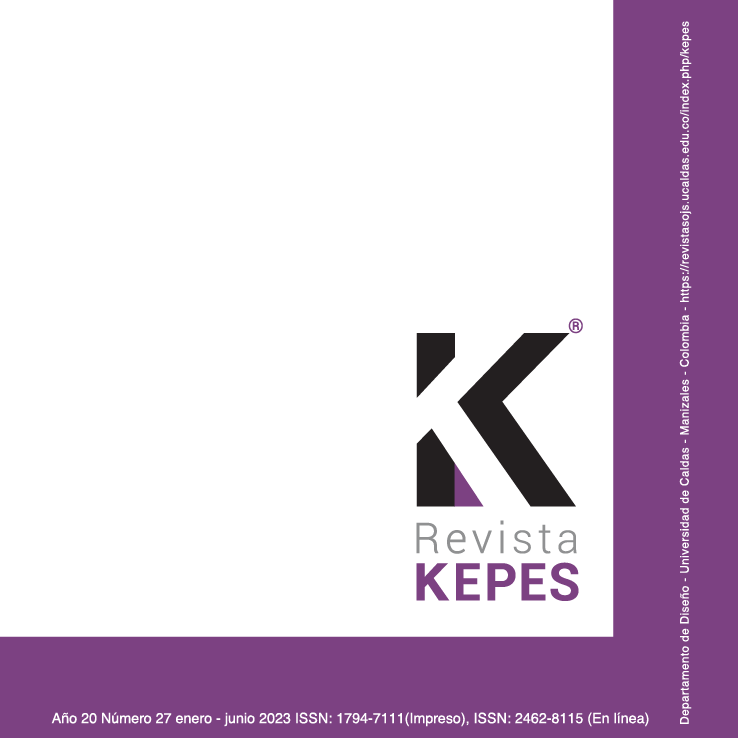Authors
Abstract
This paper gathers and presents several experiences obtained in four field visits to a region of Colombia where several codesign workshops were carried out between weaver-artisans of the Wayúu ethnic group and industrial designers. This case study allows questioning the working scenarios between artisans and designers through the concept of autonomy. In addition, it indicates some changes that those involved in co-design need in order to achieve participation with greater social justice besides modification of roles. By considering symmetrical anthropology and the concept of uncommon as tools developed in the social sciences, a reflection is carried out on the differences between workshop participants as well as differences between connected worlds, not as separate epistemologies. What differentiates people are their journeys, but everyone inhabits a world where more worlds should fit, a pluriverse. This ethical commitment invites to think of industrial design as a type of craftwork and craftwork as a type of design, opening the doors for further research. From this point of view, innovation is understood as what promotes social changes and not only what manages to successfully change a market, so all the participants in the exchanges must modify their practices to achieve this. The enormous difference in status between the workshop participants is what allows this experience to clarify issues of participation related to material and experimental practices such as industrial design and craftwork in many other parts of the world.
References
Albarrán-González, D. (2020). Towards a buen vivir-centric design: Decolonising artisanal design with Mayan weavers from the highlands of Chiapas, Mexico (Doctoral dissertation). Auckland University of Technology.
Baker, D. (1979). Jazz pedagogy: A comprehensive method of jazz education for teacher and student (# 15). Alfred Music Publishing.
Barad, K. (2007). Meeting the universe halfway: Quantum physics and the entanglement of matter and meaning. Duke University Press.
Blaser, M. (2009). From Progress to Risk: Development, Participation, and Post-Disciplinary Techniques of Control. Canadian Journal of Development Studies / Revue Canadienne d’études Du Développement, 28(3-4), 439-454. https://doi.org/10.1080/02255189.2009.9669223
Blaser, M. (2018). Doing and undoing Caribou/Atiku: diffractive and divergent multiplicities and their cosmopolitical orientations. Tapuya: Latin American Science, Technology and Society, 1(1), 47-64. https://doi.org/10.1080/25729861.2018.1501241
Blaser, M., & de la Cadena, M. (2017). The Uncommons: An Introduction. Anthropologica, 59(2), 185-193. https://doi.org/10.3138/anth.59.2.t01
Botero, A. (2013). Expanding Design Space (s): Design in Communal Endeavours. Aalto Arts Books.
Departamento Administrativo Nacional de Estadística (DANE, 2019). Población indígena de Colombia: Resultados del Censo Nacional de Población y Vivienda 2018. https://bit.ly/2qmBqjX
de la Cadena, M. (2019). Uncommoning nature stories from the anthropo-not-seen. En P. Harvey, C. Krohn-Hansen, & K. G. Nustad (Eds.), Anthropos and the Material. Duke University Press.
de la Cadena, M., & Blaser, M. (Eds.). (2018). A world of many worlds. Duke University Press.
Duque-Cardona, N. (2019). La desigualdad, un suceso no ajeno a la biblioteca: lectura, escritura y oralidad, tecnologías de poder como alternativas a la reducción de las desigualdades sociales. Forum. Revista Departamento de Ciencia Política, (15), 171-200. https://doi.org/10.15446/frdcp.n15.74673
Escobar, A. (2018a). Autonomous design and the emergent transnational critical design studies field. Strategic Design Research Journal, 11(2), 139-146.
Escobar, A. (2018b). Designs for the Pluriverse: Radical Interdependence, Autonomy, and the Making of Worlds. Duke University Press.
Escobar, A. (2019). Autonomía y diseño: la realización de lo comunal. Editorial Universidad del Cauca.
Fucai & Unicef. (2015). Comunidades Tejedoras de Vida. Kimpres.
Herrera-Araujo, F., Núñez-Méndez, J. y Quesada-Jiménez, M. (2021). Pobreza y desigualdad en la región Caribe Colombiana: ¿cómo recuperar la senda del desarrollo sostenible? Programa de las Naciones Unidas para el Desarrollo (PNUD).
Hobsbawm, E. & Ranger T. (2012) The invention of tradition. Cambridge University Press.
Human Rights Watch. (2020, 13 de agosto). Colombia: Niños indígenas en riesgo de desnutrición y muerte. Human Right Watch. https://bit.ly/3B4jWKg
Latour, B. (2012). We have never been modern. Harvard University Press.
Mamidipudi, A. (2012). Towards a theory of innovation in Handloom Weaving in India. Maastricht University.
Noronha, R. (2018). The collaborative turn: challenges and limits on the construction of common plan and on autonomía in design. Strategic Design Research Journal, 11(2),125-135.
Noronha, R. y Solis, G. (2019). Aprendiendo con los materiales: encuentro de diseñadoras y artesanos por medio de correspondencias. RChD: creación y pensamiento, 4(7), 1-15.
Quintana, M., Vargas, S. y Valbuena, W. (2017). La creatividad en el diseño: componentes sistémicos ¿Más codiseño, menos enseñanza? Arte, Individuo y Sociedad, 29(3), 445-462. https://doi.org/10.5209/ARIS.55261
Sanders, E. B.-N., & Stappers, P. J. (2008). Co-creation and the new landscapes of design. CoDesign, 4(1), 5-18. https://doi.org/10.1080/15710880701875068
Stengers, I. (2005). Introductory notes on an ecology of practices. Cultural Studies Review, 11(1), 183-196.
Venkatesan, S., Candea, M., Jensen, C. B., Pedersen, M. A., Leach, J., & Evans, G. (2012). The task of anthropology is to invent relations: 2010 meeting of the Group for Debates in Anthropological Theory. Critique of Anthropology, 32(1), 43-47.
Viveiros de Castro, E. (2004). Perspectival anthropology and the method of controlled equivocation. Tipití: Journal of the Society for the Anthropology of Lowland South America, 2(1), 3-22.

 PDF (Español)
PDF (Español)
 FLIP
FLIP






















